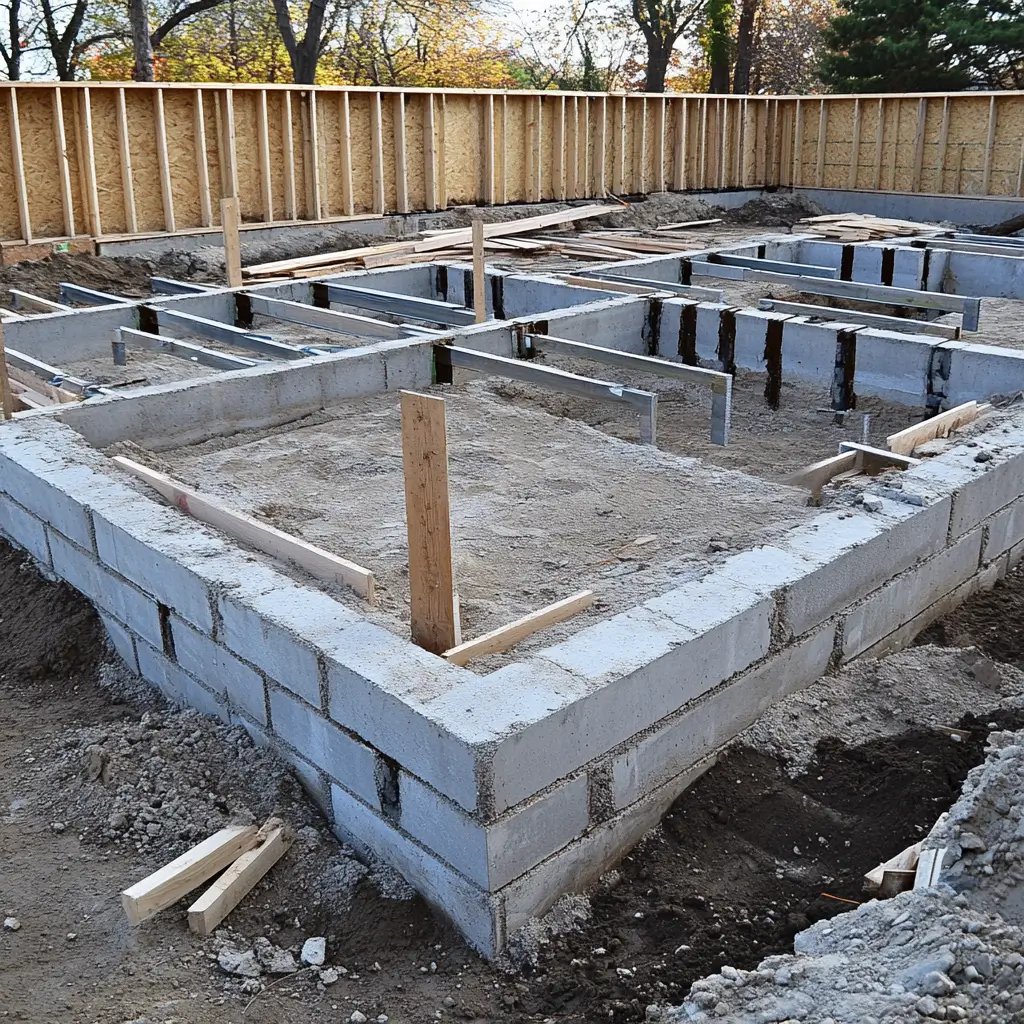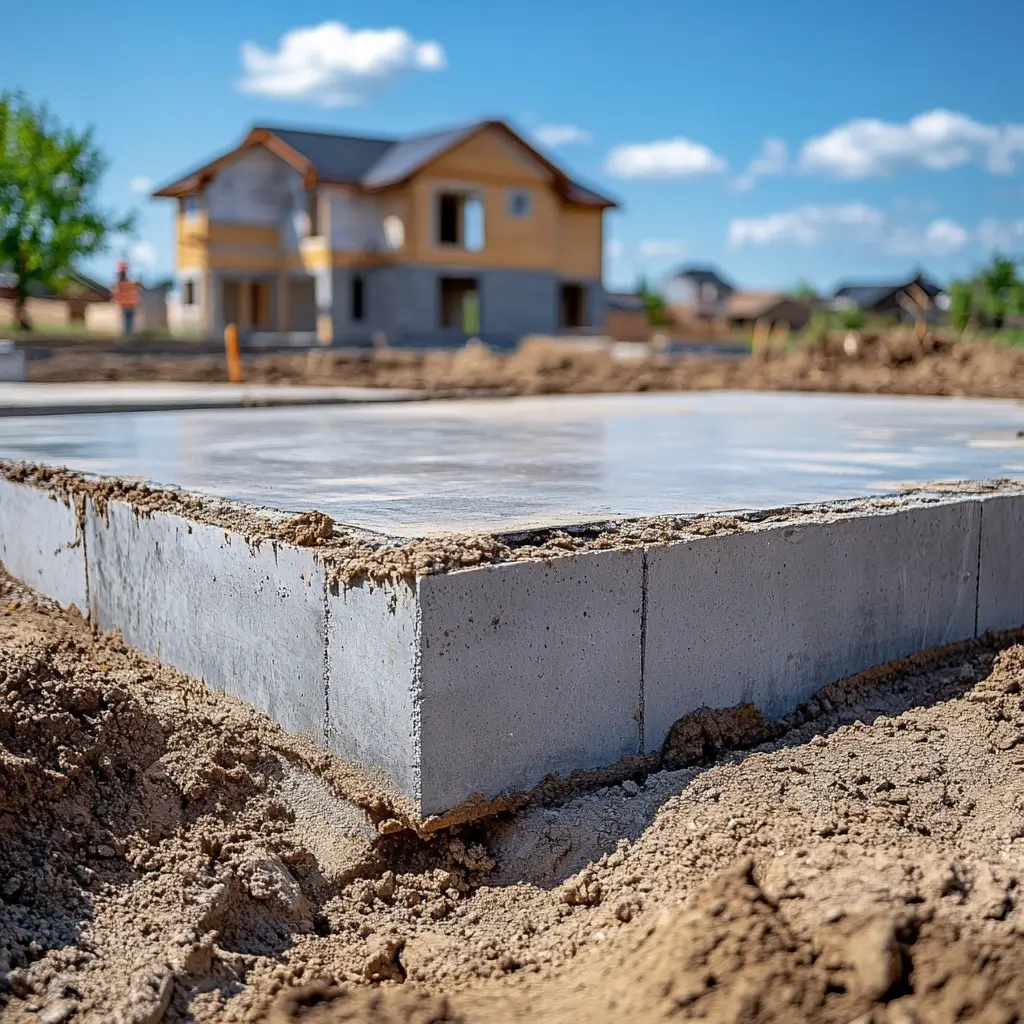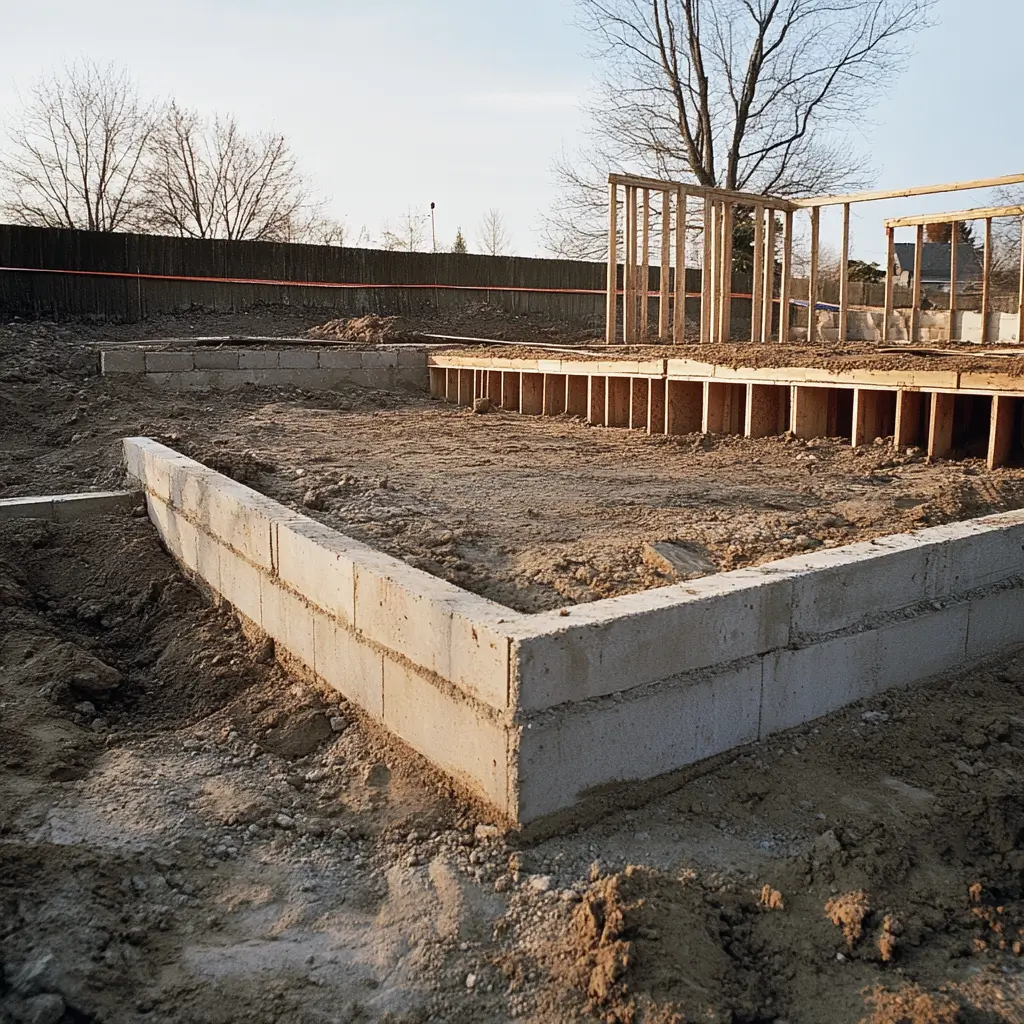How Much Does a Foundation Cost Per Square Foot?
The type, materials, labor, and site conditions all affect how much a foundation house costs per square foot.
Crawl spaces or basements are typically more expensive than a basic slab foundation. Prices can vary from $5 to $30 per square foot, depending on location and design. The ultimate cost also affects excavation, waterproofing, and soil conditions. Costs increase if the land requires additional work. Concrete thickness and reinforcement, such as rebar, are also important factors. Being aware of these facts aids in careful budgetary planning.
Follow the flow of this blog to learn about multiple types of foundations, their costs, and the factors affecting budgets. This will equip you to make better decisions!
Evaluating the Cost Of Foundation Cost For a 1000 SQ FT
When calculating the cost, size and type are the two main factors. Building a large foundation will obviously cost more. For example, the foundation cost for a 1,000 sq ft area will be lower than a 2,500-square-foot one. This means that if the foundation size increases, it will automatically increase the expense. Using a reliable Foundation Cost Estimator can help homeowners get an accurate estimate for their project since there is no fixed price for foundations.
The type of foundation is a second crucial consideration. The total cost is impacted by the various foundation types, which call for varying quantities of labor, materials, and excavation. Below is a general price breakdown for various foundation types:
| Foundation Type | Average Cost per Square Foot | Description |
|---|---|---|
| Concrete Slab | $7 | Most common and budget-friendly option, requiring minimal excavation. |
| Pier and Beam | $9 | Uses piers and wooden beams, offering better stability in certain soils. |
| Crawl Space | $13 | Includes a small space between the ground and the floor for ventilation and maintenance access. |
| Full Basement | $33 | A deep foundation that provides extra living or storage space but requires significant excavation. |
A concrete slab foundation costs approximately $2500 for a garage of 400 square feet. However, if you are targeting a full basement of 2400 square feet house, it will cost more than $80000. The expense is higher due to the additional cost of excavation, materials, and labor needs.
Understanding how foundation type and size impact costs helps homeowners budget wisely and make informed construction choices.
2,000 Square Foot Foundation Cost By Their Types
-
Concrete Foundation Cost
The average cost of a concrete slab foundation is $6 to $14 per square foot, meaning that a 2,000 square foot foundation cost home would cost between $12,000 and $28,000 in total. The most common locations for concrete slabs are flat terrain, warmer or more temperate climates, areas with shallow bedrock, and situations where money is tight.
| Pros Of Concrete Foundation | Cons Of Concrete Foundation |
|---|---|
| The least expensive home foundation | In soil with deep frost lines, it tends to move and crack. |
| No need for extensive excavation | It can be costly to drill through foundation concrete price to repair plumbing pipes. |
| Requires minimal upkeep. | There’s no extra storage space for you. |
| Doesn’t promote rodent or bug issues | You are using a floor platform that is not pliable. |
| Prevents moisture issues when a vapor barrier is put in place. |
A poured concrete footing cost foundation overall depends on its thickness, size, and whether it is a raft, stem wall, or monolithic slab:
Monolithic Slab Foundation
The slab foundation cost or monolithic foundation ranges from $6 to $14 per square foot. When building a house, the foundation is usually 6 inches thick and poured all at once. Footings placed prior to the pour are more expensive.
A monolithic slab foundation functions as a building’s floor and foundation. The slab works best in places with stable soil and level ground. One-way and two-way beam slabs fall under this type of monolithic slab.
-
One-Way Beam Slabs
In this kind of foundation, the footers and beams are poured simultaneously. A one-way beam supports the foundation on two edges.
-
Two-Way Beam Slabs
By simultaneously supporting all four foundation edges, a two-way beam offers a more stable base.
Stem Wall Foundation Cost
The foundation cost per square foot of a stem wall foundation ranges from $6 to $18. Because different sections can be built to varying heights, a stem wall foundation—a short, partially submerged wall that encircles the perimeter of the house—is an excellent option for building on a slope. Gravity-flow-based septic systems can be installed by raising the slab.
Raft Foundation Cost
The price per square foot for mat or raft concrete cost for foundation ranges from $6 to $12. The cost of adding rebar to the concrete is an extra $1.40 to $4.00 per square foot. These foundations are frequently used in areas with poor ground conditions, such as soil that is incapable of supporting any weight.
Steel-reinforced soil, columns, or walls support the concrete slab.
The raft foundation stabilizes the weight of the house and distributes it across the ground.
Concrete Slab Foundation Labor Costs
Concrete pouring labor cost for foundation slab is $3 to $7 per square foot or roughly half of the foundation’s overall cost. The cost of concrete supplies ranges from $3 to $7 per square foot. Concrete contractors bill between $50 and $150 per hour, plus an additional $60 or more for delivery.
A three-person crew usually needs eight hours to pour a foundation. Contractors pour a single, solid slab of concrete for the entire house, usually inside a wooden frame that contains rebar, after leveling the building site and pouring the footings.
-
-
Basement Foundation Cost
-
The average cost of installing a basement foundation, excluding interior finishing, is between $35 and $50 per square foot. Most homeowners invest between $52,000 and $100,000 to construct a complete basement foundation with sufficient drainage and moisture prevention.
Because basements enable the foundation to be constructed below the frost line, preventing damage from frost heave, they are most prevalent in regions with cold winters. They also come in handy when more space is essential for living or storage. You can either build a basement foundation partially above ground level or completely below ground level, depending on your lot.
Also Read : How to Accurately Figure Cubic Yard Measurements for Your Projects
| Pros Basement Foundation | Cons Basement Foundation |
|---|---|
| Robust structural support for the building | Expensive to construct and complete |
| Work well with homes that are slope-built | Because basements have fewer windows than upper levels, they may appear small and dim. |
| Extra living space that can occasionally double the current square footage | Without preventative measures, they tend to flood or develop mold and mildew. |
| A haven from hurricanes and tornadoes | It is essential to test the structure for radon and install radon-mitigation systems due to its high exposure susceptibility. |
| Warm in winter and cool in summer, providing a cozy space | – |
| Simple duct access for utility work | – |
Because basement foundations include walls in addition to a floor, they are more expensive than other types of foundations. Excavation, grading, materials, labor, size, style, and finishing costs all affect how much your basement installation will end up costing.
Here’s a table summarizing the footing foundation cost for various foundation-related expenses:
| Task | Cost Range | Factors Affecting Cost |
|---|---|---|
| Excavation for Basement | $1,500 – $10,000 | Size, depth, soil condition, equipment used |
| Excavation with Rock Ledges | Can exceed $50,000 | Presence of buried rock ledges |
| Land Grading for Construction | $1,000 – $5,000 | Land condition and slope |
| Basement Drainage System | $4,000 – $12,000 | Interior perimeter drain installation |
| Basement Waterproofing (Interior) | $4,500 – $10,000 | Type of waterproofing method used |
| Basement Waterproofing | $10,000 – $15,000 | Exterior sealing and drainage systems |
| Basement Finishing | $30 – $50 per sq. ft. | Materials, labor, design complexity |
-
-
Crawl Space Foundation Cost
-
For 2,000 square feet, a crawl space foundation costs $15 to 18 per square foot, or $30,000 to $36,000 in total. Costs increase by the need for concrete perimeter walls and additional excavation for a crawl space foundation. When more storage and convenient access to utilities are required, these foundations are more popular in warmer climates with shallow frost lines.
| Pros Crawl Space Foundation | Cons Crawl Space Foundation |
|---|---|
| A good choice for homes constructed in hotter climates on slopes | It takes a lot of work to construct. |
| Beneficial in regions vulnerable to earthquakes or flooding | Not very energy-efficient. |
| Makes plumbing and ductwork easier to access | Some can find it difficult to move to ground to the front door due to restricted mobility. |
-
-
Temp Foundation Cost
-
The term “temp foundation” refers to a non-permanent base that is used to support structures for a brief period. Compared to other house foundation cost types, temporary foundations are more affordable because they are made to be easily set up and got rid of can be utilized in a variety of ground conditions, and are frequently reusable.
Temporary buildings, such as offices on construction sites, portable classrooms, event structures, and temporary housing during disaster relief, are commonly built on these foundations. Compared to permanent foundations, temporary foundations might not offer as much stability or durability. When considering using a temporary foundation for any structure, always check the building codes and regulations in your area. For projects that require fully functional spaces—especially in sectors like education, healthcare, or hospitality—FF&E Procurement Services in California can ensure your temporary buildings are equipped with the necessary furniture, fixtures, and equipment to operate efficiently.
-
-
Pier And Beam Foundation Cost
-
A pier-and-beam foundation fix costs $8 to $15 per square foot or $16,000 to $30,000 for a 2,000-square-foot home. However, they are not as frequently used in residential homes and have limited applications in certain situations. The most common places to use them are homes on slopes, in flood-prone areas, or areas with unstable soil.
| Pros Pier And Beam Foundation | Cons Pier And Beam Foundation |
|---|---|
| Has an underground crawl space to protect the house from moisture. | May develop mildew and mold if the area is damp. |
| Perfect for residences in regions that are prone to flooding | A costly drainage system might be necessary. |
| More room for storage | Prone to decay and termite damage (wood piers) |
| Makes it simple to access the pipework, wiring, and plumbing beneath the house and is appropriate for seismic zones. | The lack of insulation beneath the house results in poorly insulated floors. |
What Other Factors Affect The Foundation Cost for 1000 Sq Ft
Numerous other important variables can also greatly impact the cost of footings and slabs. These consist of:
| Factors | Affects |
|---|---|
| Ground Preparation | The site may need leveling or clearing, and some locations require soil testing and analysis before construction begins. |
| Depth of Foundation | Deeper cost for footings and foundation, but it may be necessary for unstable soils or steep slopes to ensure structural stability. |
| Sealing, Waterproofing & Drainage | The addition of extra protection to deal with rainy and flood areas can increase the budget for waterproofing and drainage system installation. |
| Permits & Inspection Fees | Some states require permits and inspections for site preparation and foundation work, adding to the total cost. |
| Finishing Costs | To make a basement habitable, additional costs are necessary for flooring, plumbing, insulation, and drywall. |
Conclusion
Your building’s cement foundation cost consists of concrete, and the price per square foot varies depending on a number of factors. You can make a more efficient budget by being aware of these elements and carefully evaluating the requirements of your project. To make sure you’re getting the most out of your investment and that the project runs out in compliance with your specifications and local building codes, don’t forget to obtain quotes from several contractors.
FAQs
What kind of foundation is the priciest?
Due to the additional excavation, drainage, and sealing needed, a foundation with a basement is the most costly kind. However, because it gives your house more storage space (or even living space), building a basement can be a smart financial decision.
Can I make a foundation myself?
Although it’s not recommended, you can. The majority of foundations require heavy labor and precision, as well as expertise: Concrete basements are typically poured by a team, even by experts. Without extensive experience, you may wind up with an uneven foundation that leaks or cracks in a matter of years.
How long does it take to finish a foundation made of concrete?
The size and complexity of the foundation work determine how long it will take. Larger or more complex foundations can take longer to finish than a typical residential foundation, which can take one to two weeks. The weather may also impact the timeline.







